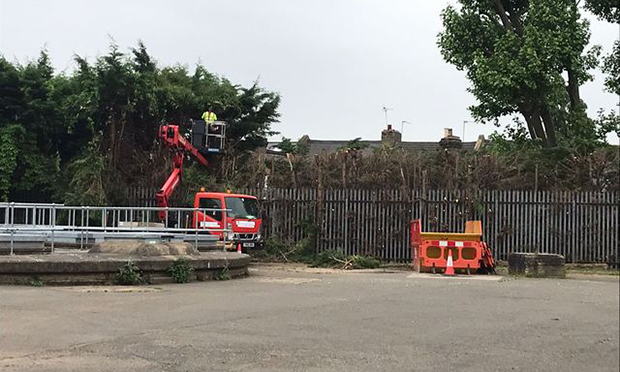‘Disastrous’: Thames Water under pressure after residents spot trees being felled during nesting season

Trees being felled at the Thames Water site. Photograph: Janet Pearce
A utility company is in hot water after residents spotted trees being felled during nesting season.
Keen swimmer Janet Pearce quizzed the people felling trees on a Thames Water site near the Castle Climbing Centre and the West Reservoir, and not far from Woodberry Wetlands nature reserve.
She was told that Hackney Council had given permission and that there were only “old nests” without eggs in the trees.
The workers said they were being “really careful”.
Another passerby also asked the workers to stop.
Pearce has asked for evidence and raised her concerns with Thames Water.
“Why are they doing it in May?” she said. “It’s really important. It’s ironic that it’s near a nature reserve opened by Sir David Attenborough.
“Birds are disappearing at a rate of knots, but we keep doing this and ignoring the fact that it’s nesting season.”
She added: “I’m aware that it’s disastrous for the bird population.”
According to the RSPB, the main nesting season runs from February to August.
Tamara Micner also challenged the water company about the timing of its work.
In response to her complaints, Thames Water tweeted that “the works taking place have been surveyed and set up appropriately and also approved by the local authorities”.
It added: “The survey was completed to ensure no wildlife is affected and the job is completely legal.”
A Thames Water spokesman said: “Following discussions with nearby residents, we agreed to fell some trees on the site which were blocking sunlight in the gardens of neighbouring properties.
“We worked with the local authority on this, but when we later became aware of nesting activity we immediately stopped the work.”
He said a work plan was first raised in January and was “awaiting approval from the local authority”.
The work will now resume after nesting season, not before October.
Thames Water has been approached for further comment. Hackney Council has also been approached.

In essence, there is no “right of light” in the way in which the council are operating in these matters. It is all just part of some anti-nature element within the council that needs rooted out.
A couple of exceptions aside, e.g. evergreen Leylandii and where there are explicitly restrictive covenants, the law does not allow for a right to direct sunlight, just a minimum level of natural illumination, and none at all in respect of land that has not been built on, e.g. gardens.
It’s just a case of small minded NIMBYism versus the environmental and biodiversity benefits of trees and shrubs.
The environmental crises we face, from air quality, to rising temperatures, and species loss all demand a radical rethink in our approach to nature and the built environment. In order to meet national government’s targets, Hackney would need to plant about 15 times more trees and shrubs, i.e. that is in recognition that the nations needs about 5 times more trees, and that Hackney has about 1/3rd of the national average (5 x 3 – 15).
At present, there are terms that prohibit trees or shrubs over two metres high above ground level in council owned properties. If the council is to come anywhere near meeting air quality targets, it needs to relax this and encourage more residents to grow their own greens.
Unfortunately at present it’s a case of “whingers win”.
Trees and shrubs have multiple, tangible benefits;
They improve air quality, reduce noise and pollution, cool buildings in summer, insulate them in winter, reduce wind forces, increase biodiversity, remove over saturated moisture (flooding from run off); they have even been demonstrated to improve mental health, and increase the value of properties in tree lined streets.
Tree rights, and those of other species who live in them, need to come before NIMBYs whingers.
In order to tackle our various environmental crises, we need to mobilise the use of all public and private land to do so.
Whereas you may not believe in global warming, no one can argue against the deaths and illnesses that are effect every age group and every demographic.
Especially now that more people aren’t going to be able to afford air conditioning in summer and heating in the winter. What nature does for free.